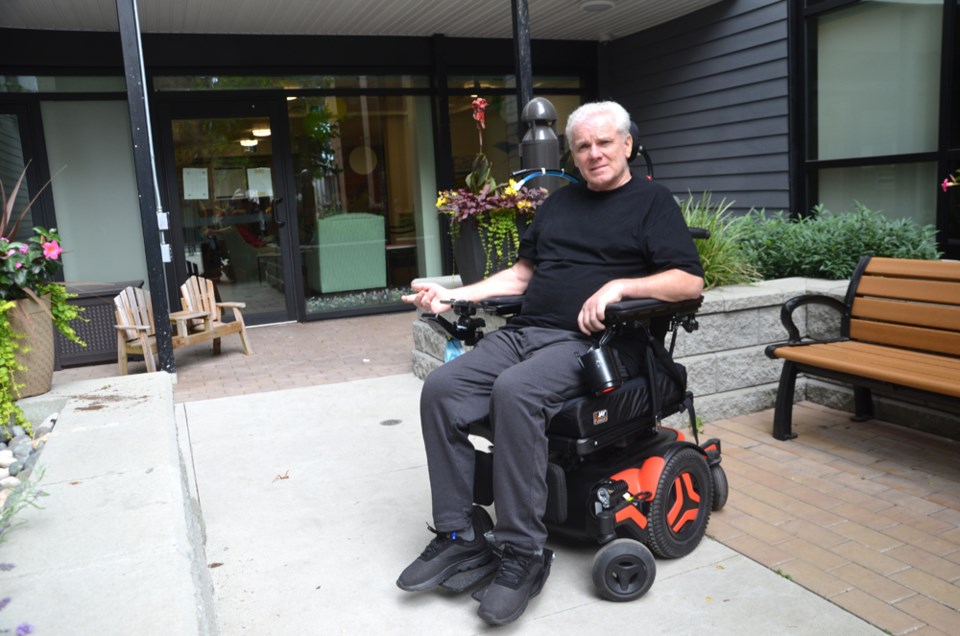A North Vancouver man injured in a vehicle collision says he has spent months separated from his family and confined to a seniors care facility because the province’s new no fault insurance regime stops ICBC from quickly reuniting them.
In October last year, Paul Zilahi was driving on North Vancouver's Main Street to pick up his kids when the driver of a truck in front of him pulled a sudden U-turn, causing a major collision. The driver was left with a dent in his truck. Zilahi suffered a spinal cord injury that left him fully quadriplegic.
“In 60 seconds, my life changed. That was it,” he said.
After months of hard work at the GF Strong Rehabilitation Centre, Zilahi now has some use of his right arm, and his care team determined he was ready for discharge, although only temporarily, to Creekstone Care Centre in North Vancouver's Lynn Creek neighbourhood.
That was five months ago.
Zilahi said he’s grateful for all the care he’s received, but his family badly needs to be back together.
“We’re frustrated. I’m grieving. My family is grieving. We are not united. We need to forgive the past and just be in the present and focus on the future. That’s what we’re all trying to do,” he said. “It’s very difficult. My wife is at the max looking after the family and the children. And they’re grieving. … They’re in school, and they need to be lifted up, they need to be encouraged, they need to get over this – seeing me in a wheelchair and quadriplegic.”
A fight with ICBC
The answer, Zilahi said, is relocating the family to a new home that can accommodate his needs, but that’s not something ICBC has been interested in.
A report from Zilahi’s occupational therapist states that his family’s condo would need major renovations to accommodate his wheelchair and the necessary medical equipment (and even then, the family would lose their living room).
“With considerable renovations, it could be possible for him to physically access a bed and bathroom. However, even with these renovations, Mr. Zilahi would not have the space for his personal care to be performed in a private and dignified way,” she wrote.
Two of the three contractors they’ve spoken with so far said the work wouldn’t be feasible, Zilahi said.
In a statement, ICBC spokesperson Brent Shearer said Zilahi’s relocation to Creekstone was at the recommendation of his care team, and that the public insurer would be meeting with Zilahi’s care team and lawyer to “clarify the recommendation to renovate the home.”
“We are supportive of Mr. Zilahi moving from the care facility to an accessible and safe home, and are working with him, his family and his care team on plans to do that,” the statement read. “ICBC has received, reviewed and supports the recommendations made by Mr. Zilahi’s occupational therapist to renovate the home, pending approval from the apartment’s strata. We are now waiting for Mr. Zilahi and his family to get permission from the apartment’s strata to do the renovation work to ensure that his home is both accessible and safe.”
No fault insurance at fault, lawyer says
Zilahi’s lawyer Robin Wishart said even if Zilahi does get the strata’s approval, which itself would be a daunting task, the option of renovating should be a non-starter. His home is on the second floor of an apartment, leaving him reliant on an elevator that would be shut down in the event of a fire.
“He will die from smoke inhalation or burn to death. So going to the strata to repair or fix the condominium is not the problem, and we believe ICBC is aware of that,” she said. “The solution that the family has been presented with is, first of all, unsafe, and second, unrealistic for that family. … He needs to be relocated immediately."
With the change to Enhanced Care, as the province calls its no fault insurance system, people who’ve suffered injuries have lost their ability to sue to get the support they need, Wishart said.
“If this was in the regular course and everyone in British Columbia has a $1-million policy, we would make a demand for the policy limits. He would have the money and he’d be able to buy a home and move, as simple as that,” she said.
Zilahi had run his own coffee company before the accident. That income is now gone, Wishart noted, and every day, there are people who suffer injuries who will then have to navigate the Enhanced Care system without legal help.
“People don’t understand when they’re injured the road they have ahead of them,” she said. “The number of people whose economic future is completely altered is just going to continue to grow.”
Zilahi said he would like to see the regulations changed.
“Because right now, ICBC is in control of everything,” he said. “I’m not the only person. I’m here, being a voice for others.”
Enhanced Care an improvement, minister says
In a statement, Minister of Public Safety and Solicitor General Mike Farnworth said the switch to Enhanced Care is meant to be less adversarial and reduce the amount paid in legal costs.
“Under Enhanced Care, ICBC’s recovery specialists are focused solely on helping each injured customer get the care they need – a shift ICBC has wholeheartedly embraced, with staff training informed by valued stakeholders in the healthcare, disability and medical fields. British Columbians injured in crashes receive all the care they need, led by the customer’s own doctor and preferred health-care providers. Our thoughts are with Mr. Zilahi and his family throughout this life-changing event.”
British Columbians may be enjoying cheaper car insurance premiums, Zilahi said, but there are others paying the costs.
“ICBC is saving millions of dollars,” he said. “And then here I am.”





